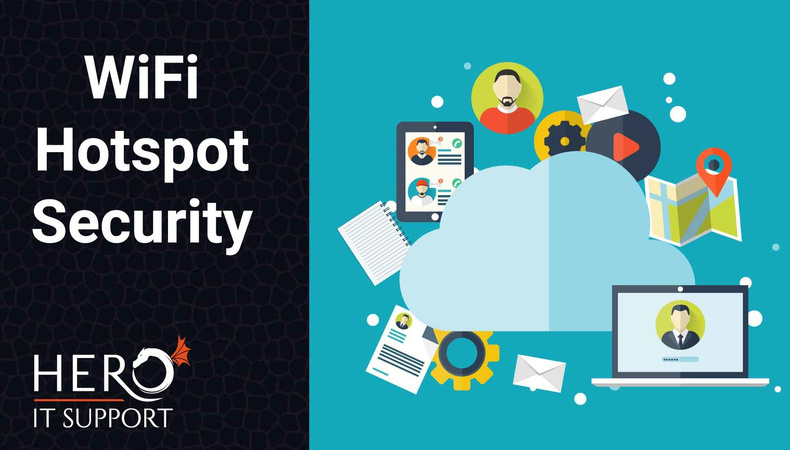Prevent Cybercrime with WiFi Hotspot Security
Do you regularly work on the go and rely on WiFi hotspots?
The secure use of WiFi hotspots is important for both business and personal safety. If you are working outside of your home or office and require WiFi on the go, make sure you know what you are connecting to. Some WiFi hotspots can be a lifeline if you have an important deadline or need to contact someone using an app. However, not all networks or hotspots that you have the opportunity of accessing, are secure. ‘Evil Access Points’ and ‘Sniffing’ are two forms of cyber-attacks you could put yourself or your business at risk of becoming victim to.
Evil Access Points
Cybercriminals set up fake WiFi hotspots usually with common or generic names such as ‘free_wifi’ or ‘coffeeshop_wifi’. The promise of free WiFi is bait to lure in an unsuspecting victim. Once connected the criminals will monitor network traffic from your device, intercept and modify traffic (‘man in the middle’ attack), try to steal any passwords, and scan your device for any more vulnerabilities they can exploit.
Sniffing
Even when you connect to a legitimate WiFi hotspot it can still be insecure if not setup correctly. Criminals exploit this and monitor network traffic for anything of value. Whether you type them manually, have auto-saved logins or you are already logged in, every time you use or open social media, emails etc the data (and security tokens) are continuously being sent over any WiFi hotspots that you connect to. Data can be intercepted and stolen. Stolen data such as passwords, login details and bank information is sold on for use by other criminals.
Take Action:
Identify the Threats
Watch out for common names like 'Cafe_free_wifi' and check the WiFi is the genuine connection for whichever venue you are in. WiFi hotspots without password access are unencrypted and therefore not secure. If an alert pops up saying "This network isn't secure. Do you want to continue?" it's probably best not to take the risk, don't connect to this hotspot.
Protect and Prevent
Protect yourself and your business by restricting your activity. If you can, try not to do anything confidential such as online banking when using public WiFi and avoid entering any passwords. If you are really unsure whether you can trust a public WiFi hotspot, use your 3G or 4G mobile data. Anything transferred over 3G o 4G is encrypted. Alternatively you can create your own WiFi hotspot using your mobile data to connect other devices to. To find out how to, go to https://heroitsupport.com/how-to-set-up-a-wifi-hotspot-on-mobile/ . The last method is by creating a VPN (Virtual Private Network) when accessing public WiFi. This ensures data transferred is encrypted. You can download VPN apps or you can set up your own by following this guide https://heroitsupport.com/how-to-set-up-a-vpn-on-a-mobile-device/ .
Report it!
If you believe you have become a victim of WiFi Hotspot cybercrime, immediately disconnect from the WiFi. Change the passwords to any accounts you were logged into and using whilst on the network and phone us straight away on 0800 680 00 88. You can also report the crime to Action Fraud.
Read more at https://heroitsupport.com/wifi-hospots-security

